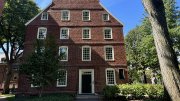During the Israel-Palestine protests that occurred on the Harvard campus during the 2023-2024 academic year, a number of students broke University rules and were punished. But because the College and each of the graduate and professional schools maintain their own disciplinary bodies and procedures, the punishments students received varied widely.
What is permissible when exercising the right to free speech on Harvard’s campus, including the right to dissent and protest, is defined in the University-wide Statement on Rights and Responsibilities (USRR) and in campus-use rules. The USRR was adopted in 1970 in response to the sometimes-violent acts of protest that took place at Harvard in 1969, and President Alan M. Garber underscored the statement’s importance and application within the first weeks of his presidency. The campus-use rules, some of them pre-existing, were first consolidated and disseminated in the summer of 2024.
Last summer, the University clarified how apparent violations of the USRR involving multiple schools would be investigated. And yesterday, Garber wrote to members of the Harvard community that he would be establishing a process to ensure consistency in administering discipline for violations of these rules across Harvard’s many schools. The University’s governing boards, he wrote, had empowered him (and his successors as president) to call on a faculty panel of the University Committee on Rights and Responsibilities (UCRR) to impose discipline in cross-school cases involving violations of these rules. The measure thus adds to the UCRR’s prior authority to investigate and find facts following alleged infractions of this nature. And it authorizes the president to establish new procedures for handling such cases, subject to review at the end of two academic years.
As Garber wrote:
The creation and implementation of new procedures is designed to ensure that disciplinary processes in cross-School cases treat like cases alike. Certainly, different consequences may be appropriate for similar conduct by a first-year undergraduate as opposed to a third-year professional school student. But no student should receive different discipline based on nothing more than the Harvard School(s) in which they are enrolled.
This centralization of certain discipline cases, where the right to speak freely is balanced against the rest of the community’s right “to learn, teach, research, live, and work without interference or disruption” is something critics have advocated since Israel-Palestine protests began. (An opinion piece in this magazine explained some of the disciplinary problems that have arisen from the University’s notably decentralized structure.) Garber’s letter to the community represents the latest step in an evolving effort to respond, by clarifying the University’s expectations and the measures that will be taken when handling transgressions.
This further step, following Garber’s January 2024 statement on the USRR, the subsequent evolution of the rules governing protest and dissent (carefully, clearly defining the rules on the time, place, and manner of protests), and the expansion of the UCRR’s investigative and fact-finding role in the event of alleged violations of the rules, is also consistent with actions within the individual schools and faculties. Most recently, a Faculty of Arts and Science committee led by Pforzheimer University Professor Ann Blair addressed problems with the disciplinary processes within the College and the Graduate School of Arts and Sciences. “The additional step we announce today,” Garber wrote, “is aligned with the foundational goals of the USRR, which has defined not only our rights but also our responsibilities to one another for more than half a century.”
Whether such steps satisfy Trump administration demands that Harvard, Columbia, and presumably other institutions centralize discipline in administrative hands cannot be known; but the measures announced today are a step toward more clarity for disciplining multi-school violations of University rules, while continuing to involve faculty members at the most senior level of investigating and ruling on disciplinary cases.
Details of the procedures Garber is now empowered to enact will follow. In the meantime, he sought to reassure students and faculty alike that the procedures he establishes “will be designed to ensure continued faculty agency in the disciplinary processes affecting their students and will ensure due process for all our students” as key elements in “building a more consistent and effective disciplinary process.”









